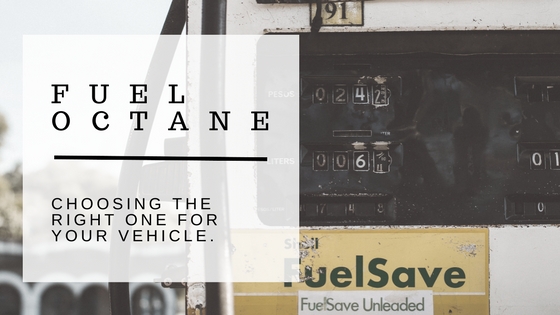If you’re like a lot of drivers, you’ve wondered whether putting higher octane fuel in your vehicle will prolong its life. While it’s something we encounter a few times each month, fuel octane remains difficult to understand for many people. As such, we’re going to dedicate today’s post to talking about how to choose the right fuel octane for your vehicle and why it matters.
What Does the “Octane” Rating Mean?
Octane rating measures the fuel’s resistance to “knocking” during combustion, which is caused by the mixture of fuel and air exploding too early in the engine. When you pull up to the pump, you can see the octane rating written behind each respective pump. Here in the United States, the standard unleaded gasoline typically has an octane rating of 87. Midgrade, on the other hand, generally has an octane rating of between 88-90 while premium will have an octane rating of 91-94.
What Should I Use in my Vehicle?
Deciding which octane fuel to use in your car can be difficult. Most experts recommend a smart way to make it simple: follow the directions set forth by your vehicle’s manufacturer. If your owner’s manual says your vehicle is designed to run on 87 octane fuel, you’re best to select standard unleaded gasoline. If you have a high-performance engine designed to run on higher octane fuel, however, you might be better off selecting premium.
Does “Treating” My Car to Higher Octane Help It Perform Better?
Most people believe higher octane fuel will help their vehicle run better or longer. Is that true, though? In the words of the Car Talk Brothers, “No. Higher octane provides no additional performance for vehicles that are designed to run on regular gas.”
That said, however, vehicles designed to run on premium fuel may get a power boost when you fill them with a higher-octane variety. Even these cars, however, can afford to run on regular unleaded most of the time.
Does Higher Octane Fuel ‘Clean’ the Engine?
While higher octane fuel won’t clean your engine, it may have better additives (or fewer additives) than gas with a lower fuel octane. This, in turn, can help keep your engine cleaner and maintain its long-term performance more efficiently.
Fuel Octane, Made Simple
Although fuel octane can seem confusing, it doesn’t have to be. Just as long as you’re using the octane recommended in your vehicle’s owner’s manual, your engine should continue running efficiently. This is especially true since most modern engines have sensors built in that help them resist “pinging,” regardless of which fuel octane they’re using.
For a selection of products that can help your engine stay in tip-top shape, visit Berryman Products today. Your source for all your car care needs, we’re here to help you get on the road and stay there.

